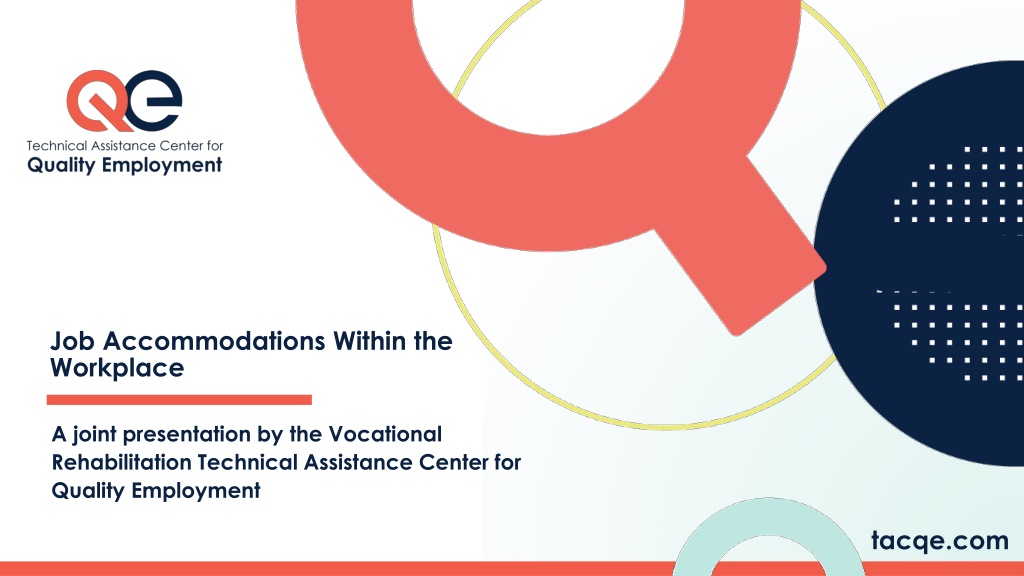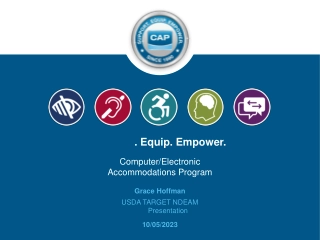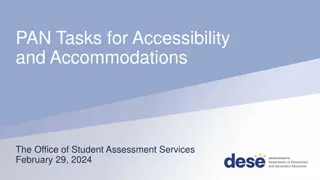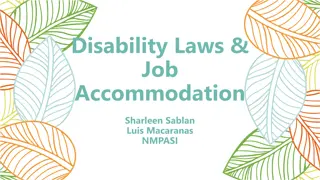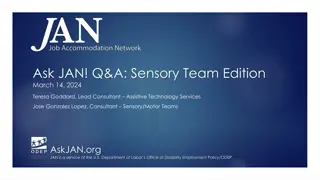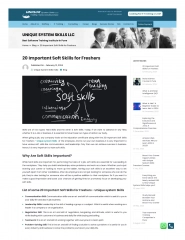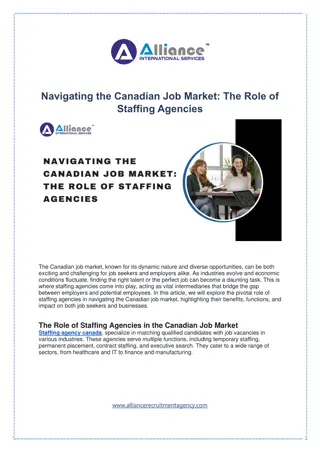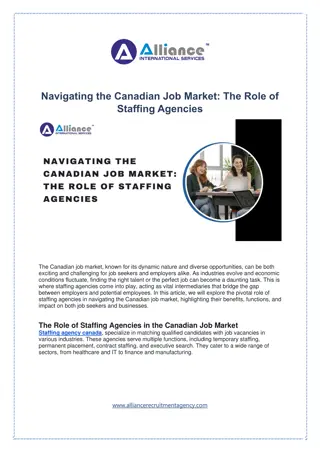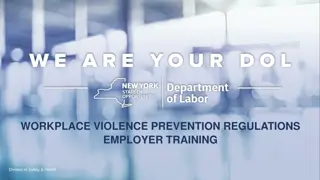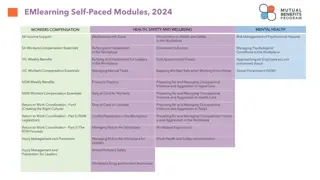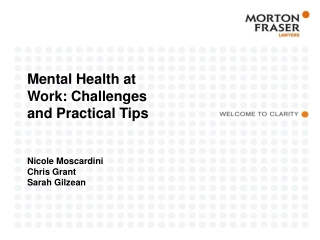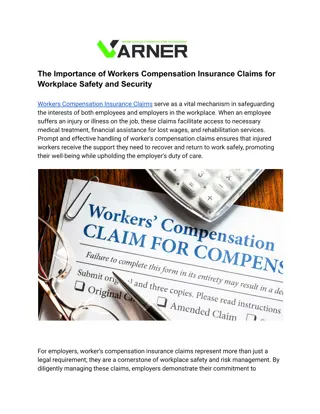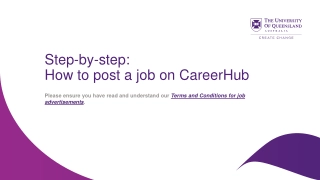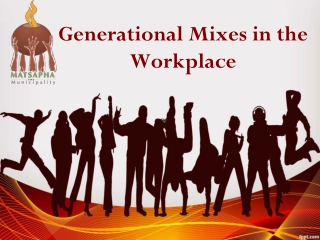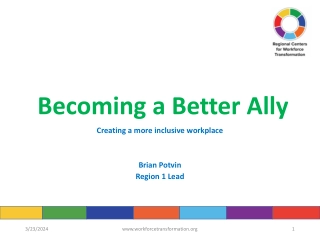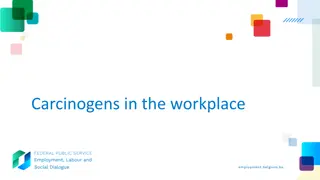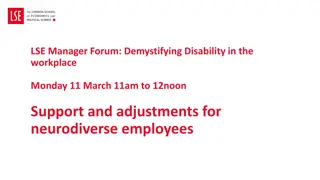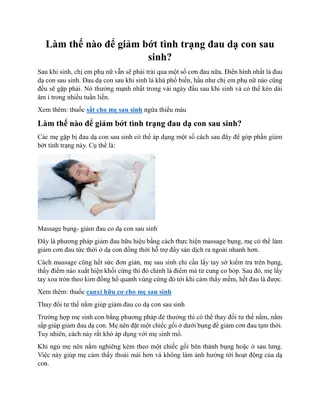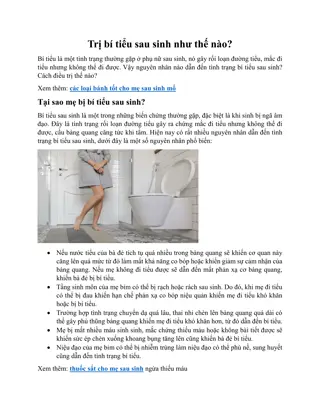Understanding Job Accommodations Within the Workplace
This joint presentation by the Vocational Rehabilitation Technical Assistance Center for Quality Employment delves into the importance of job accommodations for individuals with disabilities. It covers topics such as Title I of the ADA, requests for accommodation, determining the need for accommodation, and related strategies. The presentation aims to enhance employment outcomes for individuals with disabilities by supporting State VR agencies in implementing effective employment practices.
- Job Accommodations
- Workplace Inclusivity
- Vocational Rehabilitation
- Disability Employment
- ADA Compliance
Understanding Job Accommodations Within the Workplace
PowerPoint presentation about 'Understanding Job Accommodations Within the Workplace'. This presentation describes the topic on This joint presentation by the Vocational Rehabilitation Technical Assistance Center for Quality Employment delves into the importance of job accommodations for individuals with disabilities. It covers topics such as Title I of the ADA, requests for accommodation, determining the need for accommodation, and related strategies. The presentation aims to enhance employment outcomes for individuals with disabilities by supporting State VR agencies in implementing effective employment practices.. Download this presentation absolutely free.
Presentation Transcript
Job Accommodations Within the Workplace A joint presentation by the Vocational Rehabilitation Technical Assistance Center for Quality Employment tacqe.com
Presented by Emily Brinck Researcher- VRTAC-QE University of Wisconsin-Madison Deborah Lee Researcher- VRTAC-QE University of Wisconsin-Madison tacqe.com
Vocational Rehabilitation Technical Assistance Center for Quality Employment Goal: The Technical Assistance Center for Quality Employment will increase the number and quality of employment outcomes for individuals with disabilities through training and technical assistance to State VR agency personnel. The VRTAC-QE will support State VR agency personnel to implement innovative and effective employment strategies and supporting practices. tacqe.com
Acknowledgement & Disclaimer: The contents of this presentation were developed under a grant, the Vocational Rehabilitation Technical Assistance Center for Quality Employment, H264K200003, from the U.S. Department of Education. However, those contents do not necessarily represent the policy of the U.S. Department of Education, and you should not assume endorsement by the Federal government.
Presentation Overview Overview of Title I of the ADA Requests for Accommodation Responding to requests, either initiated by the individual or the employer, and gathering the necessary information Determining need for accommodation and accommodation strategies
TITLE I OF ADA What is title I of the Americans with Disabilities Act (ADA)? Americans with Disabilities (ADA) Act of 1990 ADA Amendments Act (ADAAA) of 2008 Prohibits covered entities from discriminating on the basis of disability, in all employment practices, and during all stages Requires reasonable accommodation for known disability of an applicant or employee who is qualified, barring undue hardship
TITLE I - ADA (CONTINUED) Who must comply with title I of the ADA? Covered entities: Private sector employers with 15 or more employees State and local government employers Employment agencies, labor unions, joint labor-management committees Religious entities as employers; title I of the ADA does apply Executive agencies of the U.S. Government are excluded; Section 501 of the Rehabilitation Act
TITLE I - ADA (CONTINUED) Who is protected by title I of the ADA? Title I protects individuals with disabilities who are qualified Applies to applicants and employees Employer-employee relationship must exist depends on whether employer controls means and manner of work performance Qualified = Individual with a disability who meets the job s general requirements AND can perform the essential functions of the job desired or held, with or without reasonable accommodation
DEFINITION OF A DISABILITY UNDER THE ADAAA A physical or mental impairment that substantially limits one or more major life activities actual disability Has had a physical or mental impairment that substantially limited one or more major life activities at one time record of When an employment action is taken based on an individual's impairment or perceived impairment, unless transitory and minor regarded as
WHO IS COVERED UNDER THE ADAAA? Conditions that are transitory AND minor generally not covered (e.g., common cold, the flu, a minor broken bone) Temporary condition lasting fewer than six months can be an actual disability if sufficiently severe Impairments easily found to substantially limit a major life activity (e.g., diabetes, blindness, HIV, epilepsy, cancer, bipolar disorder, etc.) are generally covered
REASONABLE ACCOMMODATION A change or adjustment to a job or work environment that permits a qualified applicant or employee with a disability to participate in the job application process, to perform the essential functions of a job, or to enjoy equal benefits and privileges Reasonable means feasible or plausible possible to provide without undue hardship Undue hardship an action requiring significant difficulty or expense
REASONABLE ACCOMMODATION (CONT.) No comprehensive list of accommodations that are reasonable under the ADA Employer decides what is reasonable and has the right to choose among effective solutions Preference of Individual with a disability should be given primary consideration Do not have to remove essential functions, provide personal use items, lower production standards, or create new jobs as reasonable accommodation
REQUEST FOR ACCOMMODATION An applicant or employee asks for an adjustment or change at work for a reason related to a medical impairment A healthcare provider indicates an employee requires leave for medical treatment A job applicant who uses a wheelchair and indicates that the wheelchair will not fit under a standard desk Impairment causing a problem + work-related barrier
REQUESTS FOR ACCOMMODATION Did you know? Time limit- individual is not required to submit a request upon hire or within a certain time period. Requests are best if made before performance concerns arise. No required process, forms for requesting RA, or timeframe for responding/implementing Not required to assert rights under the ADA or use terms like reasonable accommodation Not required to submit a request in writing but, documented request IS recommended
WHO IS RESPONSIBLE FOR MAKING THE REQUEST? Person with a disability is generally the responsible party to request reasonable accommodation Disability disclosure is necessary to receive accommodation, when disability and/or need for accommodation are not known or obvious Request can be made through supervisor, manager, HR someone who can act upon request Example- Telling a co-worker about a need for accommodation, although helpful for natural supports, may not be considered a request
INITIAL INQUIRY Employer may ask employee to clarify what is being requested and why Act quickly Unnecessary delays can violate the ADA Train management to recognize and respond to requests Assign responsibility for processing requests Follow a reasonable accommodation procedure Sample Reasonable Accommodation Request Form for Employers
NOT A REQUEST FOR ACCOMMODATION Voluntary self-identification of disability (e.g., Rehabilitation Act, Section 503) Disability disclosure absent work-related barrier or specific request Request for work assignments generally available to all workers in the business Examples: flexible schedule, telework, ergonomic equipment
DETERMINING IF INDIVIDUAL QUALIFIES FOR AN ACCOMMODATION How can it be determined that an individual qualifies to receive accommodation? Gather whatever information is necessary to process the request, including impairment, limitations, impact on performing job functions, and accommodations Determine if the individual has an ADA-qualifying disability Follow ADA disability-related inquiry rules
DETERMINING IF INDIVIDUAL QUALIFIES FOR AN ACCOMMODATION (CONT.) Pre-offer: No non-voluntary disability-related inquiries or medical exams of applicants until after a conditional job offer is made Post-offer: Disability-related inquiries and medical exams can be required if required for all candidates entering into the job category Employment: Disability-related inquiries and medical exams of employees must be "job-related and consistent with business necessity
DISABILITY-RELATED INQUIRIES AND BUSINESS NECESSITY When can you initiate request about accommodations? Reasonable belief, based on objective evidence, that: performance of job functions will be/is impaired by a medical impairment; or there is a direct threat due to a known medical impairment Usually, after accommodation is requested, when disability and/or need for accommodation are not known or obvious When required in positions that affect public safety Known disability affecting performance, but no request
GATHERING DISABILITY-RELATED INFORMATION When impairment and/or need for accommodation are known or obvious, focus on gathering information about the accommodation, not the disability When the impairment and/or need for accommodation are not known or obvious, may request documentation that verifies: the existence of an impairment (e.g., learning disability, seizure disorder, mental health impairment, etc.) that the impairment affects a major life activity (e.g., reading, concentrating, interacting with others, lifting, etc.) the impairment is substantially limiting in some way
HOW TO INITIATE CONVERSATION WHEN REQUEST HAS NOT BEEN MADE Is there anything we can do to support you in performing your job duties or meeting performance standards? or How can we help? No mention of disability or accommodation = no worrying about ADA disability-related inquiry rules Extends support, creates a safe space for disability disclosure, and often leads to engagement in the interactive process Best practice
IN RESPONSE TO A REQUEST Gather information about: Impairment and limitations Expected duration of impairment, limitations, and/or restrictions Essential/marginal functions and/or standards How limitations/restrictions affect ability to perform essential/marginal functions, and/or meet standards Environment, equipment, tools to be used, etc. Accommodation suggestions
RESOURCES TO DETERMINE DISABILITY AND REASONABLE ACCOMMODATIONS Resources are available! Equal Employment Opportunity Commission (EEOC): Disability-Related Inquiries and Medical Examinations of Employees Reasonable Accommodation and Undue Hardship Under the ADA (q. 6) JAN resources: AskJAN,org, A to Z by Topic: Medical Exams and Inquiries Sample Medical Inquiry Form in Response to an Accommodation Request Sample Medical Inquiry Form in Response to a Request for Leave
Thank you! Presenters VRTAC-QE www.tacqe.com contact@tacqe.com tacqe.com
